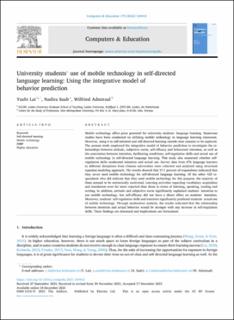University students’ use of mobile technology in self-directed language learning: Using the Integrative Model of Behavior Prediction
Peer reviewed, Journal article
Published version
Permanent lenke
https://hdl.handle.net/11250/3050434Utgivelsesdato
2022-12-21Metadata
Vis full innførselSamlinger
- Publikasjoner fra Cristin [3269]
- SPS - Documents [424]
Originalversjon
https://doi.org/10.1016/j.compedu.2021.104413Sammendrag
Mobile technology offers great potential for university students’ language learning. Numerous studies have been conducted on utilizing mobile technology in language learning classroom. However, using it in self-initiated and self-directed learning outside class remains to be explored. The present study employed the integrative model of behavior prediction to investigate the relationships between attitude, subjective norm, self-efficacy and behavioral intention, as well as the association between intention, facilitating conditions, self-regulation skills and actual use of mobile technology in self-directed language learning. This study also examined whether self-regulation skills moderated intention and actual use. Survey data from 676 language learners in different disciplines from Chinese universities were collected and analyzed using structural equation modeling approach. The results showed that 37.1 percent of respondents indicated that they never used mobile technology for self-directed language learning. Of the other 425 respondents who did indicate that they used mobile technology for this purpose, the majority of them seemed to be extrinsically motivated. Learning activities regarding vocabulary acquisition and translation were far more reported than those in terms of listening, speaking, reading and writing. In addition, attitude and subjective norm significantly explained students’ intention to use mobile technology, but self-efficacy did not have a direct effect on students’ intention. Moreover, students’ self-regulation skills and intention significantly predicted students’ actual use of mobile technology. Through moderation analysis, the results indicated that the relationship between intention and actual behavior would be stronger with any increase in self-regulation skills. These findings are discussed and implications are formulated.

